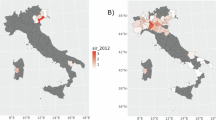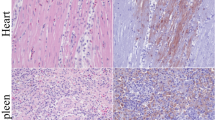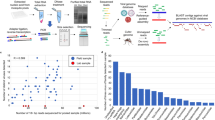Abstract
REVERSION virus of black currant (Ribes nigrum L.) is transmitted by the gall mite Phytoptus ribis Nal. It is now known that the relationship between virus and vector is unusually complex and that infection with reversion virus increases the host's susceptibility to mites. This was demonstrated by exposing healthy and virus-infected bushes of the variety ‘Wellington XXX’ to mites spreading from adjacent bushes.
Similar content being viewed by others
Article PDF
References
Thresh, J. M., Ann. Rep. East Malling Res. Sta. 1962, 99 (1963).
Lees, A. H., Ann. Rep. Long Ashton Res. Sta. 1920, 66 (1921).
Lees, A. H., Ann. Rep. Long Ashton Res. Sta. 1921, 58 (1922).
Leach, J. G., Insect Transmission of Plant Diseases (McGraw-Hill Pub. Co., Ltd., London, 1940).
Kennedy, J. S., Nature, 168, 890 (1951).
Maramorosch, K., T.pl.ziekten, 64, 383 (1958).
Carter, W., U.S. Dept. Agric. Tech. Bull., 206, 115 (1930).
Severin, H. H. P., Hilgardia, 17, 121 (1946).
Carter, W., J. Anim. Ecol., 8, 261 (1939).
Arenz, B., Z. PflBau PflSch., 2, 49 (1951).
Kennedy, J. S., Nature, 168, 825 (1951).
Hijner, J. S., and Cordon, F. M., Meded. Inst. Suikerbeit., Bergen-o-Z., 23, 251 (1953).
Baker, P. F., Ann. App. Biol., 48, 384 (1960).
Wilson, N. J., Jones, L. S., and Cochran, L. C., Plant Dis. Rep., 39, 889 (1955).
Author information
Authors and Affiliations
Rights and permissions
About this article
Cite this article
THRESH, J. Increased Susceptibility to the Mite Vector (Phytoptus ribis Nal.) caused by Infection with Black Currant Reversion Virus. Nature 202, 1028 (1964). https://doi.org/10.1038/2021028a0
Issue date:
DOI: https://doi.org/10.1038/2021028a0



